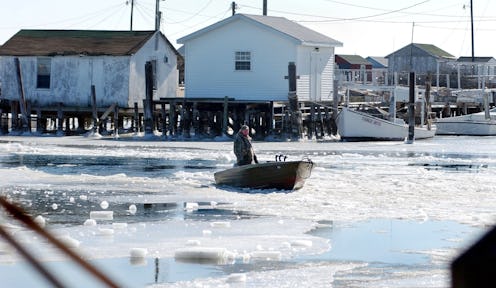
Roughly 87 percent of people on Tangier Island voted for Donald Trump in the presidential election — but he is not necessarily prioritizing the island's needs in return. Tangier Island is threatened by erosion and rising seas, but Trump told the island's mayor that climate change will not pose a risk.
Virginia's Tangier Island is situated in the Chesapeake Bay, and has a population of approximately 450 people. CNN's Jennifer Gray described the island as a "quirky little town" where "everybody knows everybody." Its residents are well-aware that the rising sea level presents a threat to their future and the island's continued existence, but they don't fault Trump for withdrawing the United States from the Paris climate agreement. Instead, they think that this decision will allow the president to devote more money to Tangier Island's infrastructure. Indeed, as CNN's Gray remarked during her visit there, the island's residents care more about saving Tangier than they do about what causes climate change.
"I agree with the science behind sea-level rise and global warming but it's all irrelevant to us right now. We're worried about washing away," resident Bruce Clark Gordy told CNN.
A few days after Gray's report aired, Trump reportedly called James "Ooker" Eskridge, the island's mayor. Eskridge spoke to the Daily Times in Salisbury, Maryland about his conversation with the president.
"You've got one heck of an island there," Trump told Eskridge after introducing himself. The mayor replied by telling Trump that "this is a Trump island; we really love you down here." Eskridge proceeded to offer Trump his compliments, and lauded him for doing "common-sense stuff" like supporting the military.
Trump thanked Eskridge, but then switched gears by talking about rising sea levels.
"He said not to worry about sea-level rise," Eskridge said. "He said, 'Your island has been there for hundreds of years, and I believe your island will be there for hundreds more.'"
Trump also told Eskridge not to worry about the "negative feedback" the island received following the CNN report. Eskridge conceded to CNN that the erosion of the island is a major concern, but he said that he trusts Trump to help. Scientists, however, would caution Eskridge against taking Trump's advice to not worry about climate change.
According to the Army Corps of Engineers, the island — which is only 1.3 square miles of "very soft organic clay soil" — is losing about 15 feet of coastline with each passing year. As Forbes' Marshall Shepherd pointed out, the island is a crabbing community, which means its residents will have to contend with other climate change-induced problems as well.
Increasing global temperatures combined with melting glaciers are rapidly contributing to the expansion of oceans. This, in turn, means that low-lying coastal communities are at high risk of seeing their homes vanish. As The New York Times reported last summer, Tangier Island's residents constitute a working-class community that cannot afford to fund the infrastructure required to protect themselves from the rising seas. Any adequate help would have to come from the federal government — but while Trump was willing to make time to call the island's mayor, it doesn't seem likely that he'll prioritize its protection, or the anti-climate change efforts needed to protect future generations.
David Schulte, of the Army Corps of Engineers, told the Times that the residents of the island must grapple with both short-term and long-term difficulties:
It will take two things to save the island. One is to engineer and repair it now. The other is to make sure that the worst-case scenario of climate change doesn’t happen, because I’ve seen what that looks like in the computer modeling, and we don’t want to go there. A lot of Norfolk is under water. Miami is under water.
This is a potential future that is weighing on residents' minds, but they — and their mayor — are still convinced that the island can be saved and is worth saving. The alternative would mean that they make up the last generations occupying the island, which has had a long history since settlers arrived there in the early 1600s.
"The island disappearing — it's on everybody's mind when they wake up and when they go to bed," Eskridge told CNN. "It's always in the back of your mind. Sure is, always."